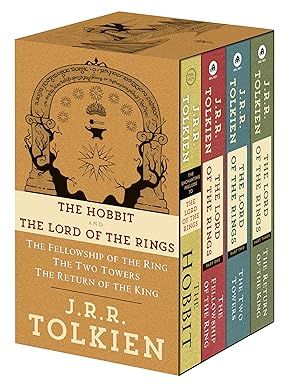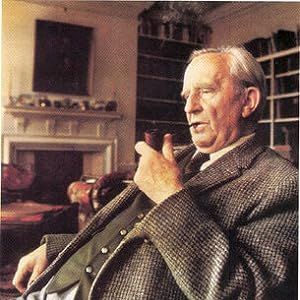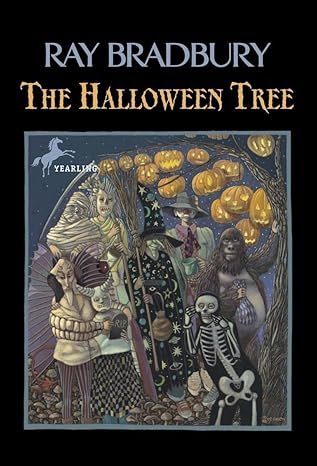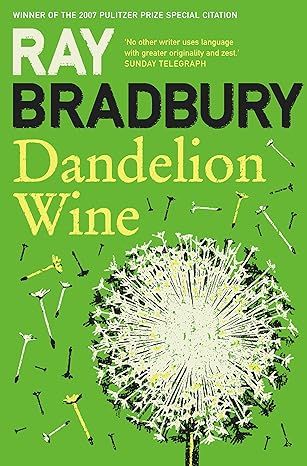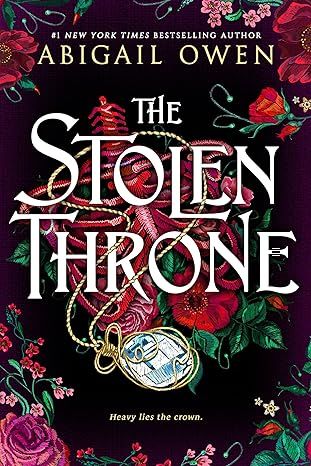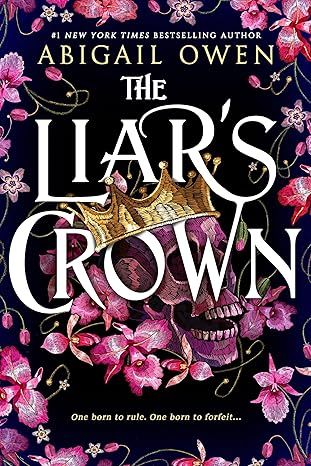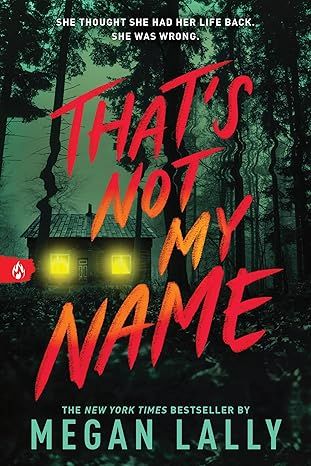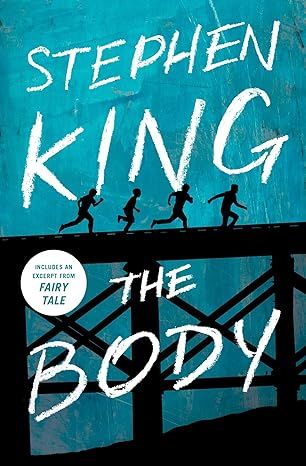J.R.R. Tolkien 4-Book Boxed Set: The Hobbit and The Lord of the Rings
4.8
-
21,709 ratings
NATIONAL BESTSELLER • The complete four-book boxed set of the greatest fantasy epic of all time: The Lord of the Rings and its enchanting prequel, The Hobbit
When Thorin Oakenshield and his band of dwarves embark upon a dangerous quest to reclaim the hoard of gold stolen from them by the evil dragon Smaug, Gandalf the wizard suggests an unlikely accomplice: Bilbo Baggins, an unassuming Hobbit dwelling in peaceful Hobbiton.
Along the way, the company faces trolls, goblins, giant spiders, and worse. But as they journey from the wonders of Rivendell to the terrors of Mirkwood and beyond, Bilbo will find that there is more to him than anyone—himself included—ever dreamed. Unexpected qualities of courage and cunning, and a love of adventure, propel Bilbo toward his great destiny . . . a destiny that waits in the dark caverns beneath the Misty Mountains, where a twisted creature known as Gollum jealously guards a precious magic ring.
This boxed set includes:
- THE HOBBIT
- THE FELLOWSHIP OF THE RING
- THE TWO TOWERS
- THE RETURN OF THE KING
Paperback
$38.00
Mass Market Paperback
$20.77
Ships from
Amazon.com
Payment
Secure transaction
ISBN-10
0345538374
ISBN-13
978-0345538376
Print length
1728 pages
Language
English
Publisher
Del Rey
Publication date
September 24, 2012
Dimensions
4.24 x 4.16 x 6.98 inches
Item weight
1.99 pounds
Frequently bought together
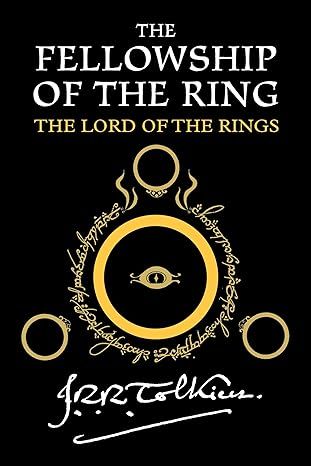
The Fellowship Of The Ring: Being the First Part of The Lord of the Rings (The Lord of the Rings, 1)
4.8
-
22,514
$12.08
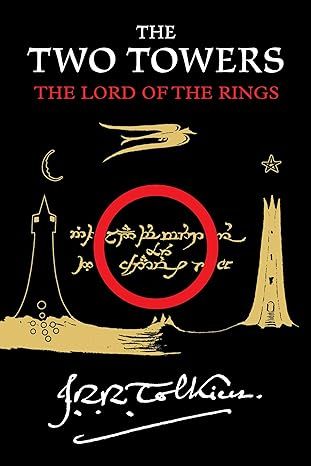
The Two Towers: Being the Second Part of The Lord of the Rings (The Lord of the Rings, 2)
4.8
-
13,625
$12.54
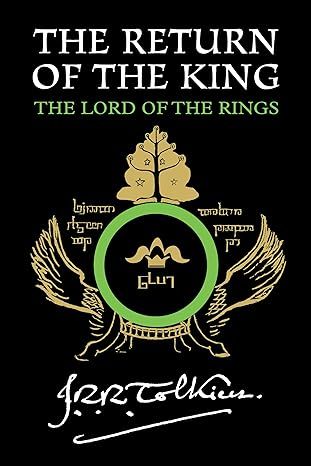
The Return of the King: Being the Third Part of the Lord of the Rings (The Lord of the Rings, 3)
4.9
-
10,910
$11.13
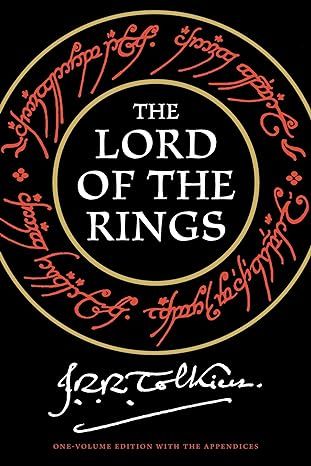
The Lord Of The Rings
4.8
-
3,795
$12.49
Editorial reviews
"The Lord of the Rings is an extraordinary work -- pure excitement". The New York Times
"The Hobbit is a flawless masterpiece". The Times of London
About the authors
J. R. R. Tolkien
J.R.R. Tolkien was born on 3rd January 1892. After serving in the First World War, he became best known for The Hobbit and The Lord of the Rings, selling 150 million copies in more than 40 languages worldwide. Awarded the CBE and an honorary Doctorate of Letters from Oxford University, he died in 1973 at the age of 81.
Reviews
Customer reviews
4.8 out of 5
21,709 global ratings
AJ
5
Take It from A Tolkien Convert
Reviewed in the United States on July 3, 2017
Verified Purchase
I haven't read this new set I purchased; however, I have read the series. I ask that you, please, bear with me; there's a backstory as to why I purchased this series for myself.
As a preteen, my father bought me a set of Tolkien—The Hobbit and LOTR—but, as I was into The Babysitter's Club and Nancy Drew, Fear Street and Sweet Valley Twins, my reaction was, basically, to turn up my nose at fantasy and science fiction. A few years later, probably when I was in high school or in my early twenties, I donated the set to my local library.
But, when I was in the seventh grade, I had an English teacher, Mr. Phillips, whose mission was to get his students to try new genres. Seeing my penchant for reading and the fact that I was an A student in his class (I've always enjoyed and excelled in English class), he was mortified because I only ever chose any English teacher's nightmares in literature: the books I listed above! Oh, he didn't mind at first. I'd bring in my latest Nancy Drew, and he'd approve it. (The way he conducted the Reading portion of our Reading/English class was to give us a point system based on the books we’d read, and I had to have a certain number to maintain my A. He’d give us, say, 15 days to read a book and then he’d sit us down for a one-on-one interview, discussing the finer aspects of our chosen tomes.) At first, my picks netted me whatever were the highest points he'd give (say 30 points for a book). But, after a while, he started docking points (my 30 became 25 became 20…) because he just couldn't stand ANOTHER Babysitter's Club or Fear Street. I complained, and he, more or less, blackmailed me into trying other genres: Mr. P: "You're such a smart girl, and you love to read. I don't understand why you waste your time on this stuff." AJ: "Because I like them." Mr. P: "Be that as it may, I'll give you higher points again when you try something new" (or is that bribery?). Anyhow, he talked me into it. The problem was, he gave me the WORST stories to try. We're talking Isaac Asimov's science-fiction horror (and, by horror, I don't mean scary but a cataclysmic BORE), which, to this day, I don’t remember much of (I must’ve slept through most of it); all I recall was the story was about a guy who went through life with an imp or demon or something sitting on his shoulder. Ugh! It was a YAWNER for me. And, at the end of the book, Mr. P called me up for my interview. I grudgingly trod the steps from my desk in the back to his at the head of the class, book in hand, dreading this moment. I sat down at the chair he’d position right beside his at his adult desk. He took the book from me, smiling that smile that rarely ever left his face (this was a man who ADORED books and life in general), and skimmed the pages. “So, tell me about this book,” were his first words. What could I say but the truth? I hadn’t a clue what the story was about. His brow furrowed slightly as he questioned me further. “Yes, Mr. P. I read it all, but, honest, I don’t remember a thing! It was SO boring and confusing.” At the end of my sweaty-brow Asimov Inquisition, he gave me full points simply because I tried something new and was honest about my feelings, but he never got me to try fantasy or science fiction again.
It was probably after this traumatic experience with science fiction that, when I came across my dad’s Tolkien gift, with trembling fingers of post-traumatic sci-fi revulsion, I picked up the set and hurried to my library to see them into the hands of those tin-foil-hat wearing weirdos who eat up fantasy and science fiction. (Don’t freak or get offended. Remember, I was a kid and vehemently AGAINST these genres, thanks to Asimov’s truly bizarre story.)
Fast forward to 2001. All over the place, LOTR is being advertised. You couldn’t turn on the television without either the Fellowship’s being advertised for Burger King glasses or Sci-Fi channel’s hosting a behind-the-scenes look into the making of the movie. And, each time, I quickly turned the channel or muted it.
And then something strange happened. One day, for whatever reason, movie one was playing on cable (a Bravo free-weekend trial or something), and I just decided, “What the heck?” and watched.
I was hooked.
After having seen all three, I was talking to a librarian and telling him that I’d never read the books and wondered aloud that the movies must’ve been in keeping with the novels since they’re so popular, “surely Peter Jackson wouldn’t have made changes, right?” The look on the librarian’s face told me how wrong I was. So, as a personal challenge to myself, I went straight for book one in the series. He was right. The movies varied greatly from the books. But I still liked the movies and, will wonders never cease, am now a fan of the books! I checked out The Hobbit after I’d finished the LOTR series and found I liked it, too! As of this writing, I not only have the series on DVD but own the books!
So, I owe Mr. Phillips a thank you for trying to expand my reading horizons. Because of him, once I got old enough to appreciate what he was trying to do for me (and all the kids in my class), I made it my personal quest to venture out of mystery and suspense (though, I must confess, these are still my favored genres) once in a while and try something new. This new mission of mine led me to The House of Seven Gables, which, I was surprised to find, I liked, to The Tenant of Wildfell Hall, which I adore, and to The Count of Monte Cristo, which, though it dipped in areas, overall, I liked it. It also led me to Jane Austen, Charles Dickens, and, of course, Tolkien.
I can’t say that I’m a convert to science fiction and fantasy, but I no longer hold up my nose or experience palpitations of revulsion at the sight of an Asimov book. But, no, I won’t be trying his stuff out again. Once was enough. (And I feel the same about Steinbeck! PLEASE don’t get me started on Old Man and the Sea!)
Anyhow, very long story short, Tolkien’s quartet is a worthy read. The Hobbit’s perfect for kids. My dad was on to something, though I didn’t give them the chance they deserved. My advice to anyone who wants to expand his kid’s reading repertoire is, as with cooking and food, start your youngster on a varied diet early on. Don’t wait till he’s 13 and set in his literary epicure to foist Tolkien on him. Get his taste buds used to a literary smorgasbord from an early age. If you want his tastes to run the gauntlet later in life, why not read him The Hobbit as a bedtime story? How much fun will you two have right before bed, traveling with Bilbo and the Dwarves through Middle Earth, encountering Goblins and Spiders and Gollum? And how much fun for both of you when you act out the story in British accents? Your child will giggle when you hiss out a Cockney accent for the Spiders! And later, when he’s older, you’ll have primed his palette for a foray into LOTR. Yes, they’re long books, each one two volumes and VERY verbose in sections (especially when describing the scenery!), but the expedition will be worth it at the end for your kid simply because it will be a continuation of the Bilbo-Ring tale you started when he was a little boy.
There are so many awful books being foisted on society today, but Tolkien’s quartet has stood the test of time. For a reason. They’re entertaining and have true-to-life lessons. The good people in the stories go through hell a time or two, weathering through the highs and lows of life. Just as in real life. No one’s exempt from facing challenges and hurdles, hardships, tests and trials. We all meet with pain and grief and confusion and sadness at least once in our lives. Just as the characters in the books. There are times when we have to decide: Is what I’m having to endure truly worth this hell? Usually, the answer is Yes, because you just have to believe that what’s on the other side will be so much better. So, as Frodo, as Aragorn, as Gandalf, we push on and make it through our valleys-of-the-shadow moments. Not a single character in the book is spared from having to endure the awful aspects of their quest: pain, struggle, lack, fear, death. And not a single person alive has escaped one or all of these. However, at the end of the quest lies the reward. For the characters in the book, the reward was a Ring-free world. In real life, depending on your beliefs, maybe the end of your hardship is simply a degree or a clean bill of health. Maybe you know that this life is only temporary, a dress rehearsal for what comes next, or, as Imhotep says in The Mummy, “death is only the beginning,” and your reward is a robe and a crown and a “Well done, My good and faithful servant” from your Savior. Whatever your beliefs, you will struggle in this life, but the good news is, if you stick with it, if you endure to the end, as the characters in these books, you come out of it stronger, better, wiser. What I’m trying to say is that, unlike too many stories today where Evil always wins, though Evil does have its moment in Tolkien’s quartet, at the end, Good triumphs. And so it is in life. Evil has its moment, yes, but, if we persevere, Good will triumph. It may not look as we thought it would look when all’s said and done, but Good triumphs nonetheless. Somehow. Frodo came out missing a finger, but the fact still remains: Frodo came out, triumphant. Éowyn may not’ve gotten Aragorn, but she did get Faramir. Gandalf faced death, but he conquered it and helped lead Middle Earth into victory. Maybe we face different challenges in real life, but the moral of the story stays the same: Fight the good fight, win your race, and you will come through. Stronger. Better. Wiser.
Get your child started on Tolkien early so that, when life begins to rear its ugly head for him, he’ll be prepared to weather his burdensome quest against the traitorous Sarumon friends in his life, against the relentless pestering Gollum teachers in school, against the heinous Orc bosses in the workforce—right on through to the end. Just as Bilbo, Frodo, Sam, Aragorn, Gandalf, Legolas, and all the rest.
Read more
405 people found this helpful
Joel D. Hirst
5
That which is old and good and true
Reviewed in the United States on April 12, 2020
Verified Purchase
“Lord of the Rings”, or #LOTR as it has been dubbed following the filming of two series by Peter Jackson, one quite good and then the Hobbit three-part series virtually unwatchable – garbage in technicolor. He forgot, in that filming that the greatness of the Hobbits was to be found in feats of epic goodness, not martial strength, and had Bilbo sword-in-hand fighting the Wargs. J.R.R. Tolkien is still turning and turning and turning again.
#LOTR, of “Big Bang Theory” fame, is not – as Hollywood’s illiterate would have us believe – an extended version of Dungeons and Dragons, a refuge for “Nerds” who cannot “get laid” (if you will pardon my crude vernacular). As in with all things, ‘pop culture’ that cannot fathom right and wrong, truth or goodness and therefore must pervert it and warp it to their misunderstanding has also sought to take #LOTR and give it to the ‘losers’ of the world.
Thank God the ‘losers’ do tend to strike back, having more staying power than the the denizens living under that storied hill outside of Los Angeles who gave us the likes of “Dude, Where’s My Car” and “The Hangover”. Thank God for J.R.R. Tolkien.
I recently completed #LOTR with my little boy, seven years old. Stretching him, to be sure, for the vocabulary that Tolkien brings to bear is prodigious indeed. But that is good for my son. And better for him yet, is the need to wrestle with right and wrong, giving him a sense of good and evil and the epic fight to do what is right in a society that tends to sell facile answers in response to life’s intractable questions. Why would Frodo choose to go on, to the bitter end, without even a mouthful of “lembas” with which to begin the journey home? Who cares what happened to the world, if he were to die in the process of saving it? Why not try and put the ring to the service of Boromir of Gondor – after all power is amoral, is it not? Nothing is ‘right’ or ‘wrong’ – perhaps Sauron was being misjudged after all or perhaps the perfect beautiful dictatorship of Galadriel, an ice queen beautiful and terrible as the night – might be better than the bumbling Gandalf always concerned with ideas of restraint and propriety.
And the story itself? It was not, as Peter Jackson probably thinks, a cool mid-century tale of knights and trolls and ogres. Tolkien pulled his story from seeds buried deep – since the belly of time – the ancient ring brought to us by Norse legend, the figure of Gandalf a wizard from the misty days of the North-Atlantic when somebody sat on a rock and penned the saga of Grendel (which, also, Hollywood ruined). It is deeply religious, though Tolkien himself denied it – a eucatastrophe where victory is seized at the eleventh hour from the jaws of a more-powerful defeat by a cast of characters which are not deeply flawed but deeply weak.
Therein lies the heart of this story, and what I hope my little boy will take with him as he engages with life and reads and rereads #LOTR, as I hope he will. Why did Frodo succeed? He was not stronger, nor was he craftier, nor was he more disciplined. Nor even did he have a great confidence, the character is wracked with doubt and despair through every page of the epic. How did Sauron allow him to infiltrate to the very dark heart of his kingdom without even a glance? It is because Sauron could not conceive of such self-sacrifice. Surely the ring, if obtained, would be used against him. Is that not the way of the world? How can such power be eschewed when needed — do we not even have a glimpse of this in Boromir? But even if not used, surely it would be safeguarded, for who knows the future? A talisman to be bartered with in exchange for boats to follow the elves into the west, when Gondor at last fell? Yes, hedging… that is always the better part of valor. But to send two diminutive characters into the heart of darkness on a fools errand from which there would be no return? An act of suicide, self-immolation? This is not something that fit in Sauron’s imagination.
I have always been bothered a little bit by the end of #LOTR, which echoes just a little bit the end of The Hobbit but oh-so-much-worse. The ruin of the shire. We who fight the darkness like to think that the places we fight for remain pristine and unchanged, as they are in our own imaginations, while we battle the Smaugs and Saurons of our own. That when it is done, like Lawrence of Arabia we return to the hills and dales of our youth and find the milkmen and the postmen and the Blockbuster Video store exactly where we left them. But the epic in this world knows no boundaries and evil is the ultimate ‘globalized’ force flowing back and forth over borders which we are unable to close to the madness. When Frodo returns, to find his shire having been occupied by a weakened Saruman, it is said this is a reflection upon Tolkien’s own return from World War I to have found the rapid industrialization required to win that war having laid waste to the green areas of his youth. World War I was a great, world-altering conflict. The end of the Age of Lords, nobility and the great houses we watch in Downton Abbey and smile at their stuffy conservatism. Brought down by the factories which raged across England, and which Tolkien knew were both a cause-and-result of the epic battle against evil.
There is so much to learn from The Hobbit, #LOTR and I am so grateful to J.R.R. Tolkien for having given the world this saga, to teach our little boys generation after generation of those things that need not change, must not change in a world that has no time for that which is old and good and true.
Read more
128 people found this helpful
Virginia Potts
5
My daughter loves all things related to Lord of the Rings
Reviewed in the United States on June 7, 2024
Verified Purchase
My daughter had an old Hobbit book. It was time for a new one. As she recently watched all of the Lord of the Rings movies, I knew she would love the books. This set included all four books and she was very happy to get them for Christmas. She finally finished reading them all, and loves them.
Top J. R. R. Tolkien titles
View all
The Return of the King: Being the Third Part of the Lord of the Rings (The Lord of the Rings, 3)
4.9
-
10,910
$11.13

The Two Towers: Being the Second Part of The Lord of the Rings (The Lord of the Rings, 2)
4.8
-
13,625
$12.54

The Fellowship Of The Ring: Being the First Part of The Lord of the Rings (The Lord of the Rings, 1)
4.8
-
22,514
$12.08

The Lord Of The Rings
4.8
-
3,795
$12.49
Similar Books
Best sellers
View all
The Tuscan Child
4.2
-
100,022
$8.39

The Thursday Murder Club: A Novel (A Thursday Murder Club Mystery)
4.3
-
155,575
$6.33

Sapiens: A Brief History of Humankind
4.6
-
140,302
$13.49

The Butterfly Garden (The Collector, 1)
4.3
-
88,556
$9.59

Things We Hide from the Light (Knockemout Series, 2)
4.4
-
94,890
$11.66

The Last Thing He Told Me: A Novel
4.3
-
154,085
$2.99

The Perfect Marriage: A Completely Gripping Psychological Suspense
4.3
-
143,196
$9.47

The Coworker
4.1
-
80,003
$13.48

First Lie Wins: A Novel (Random House Large Print)
4.3
-
54,062
$14.99

Mile High (Windy City Series Book 1)
4.4
-
59,745
$16.19

Layla
4.2
-
107,613
$8.99

The Locked Door
4.4
-
94,673
$8.53
